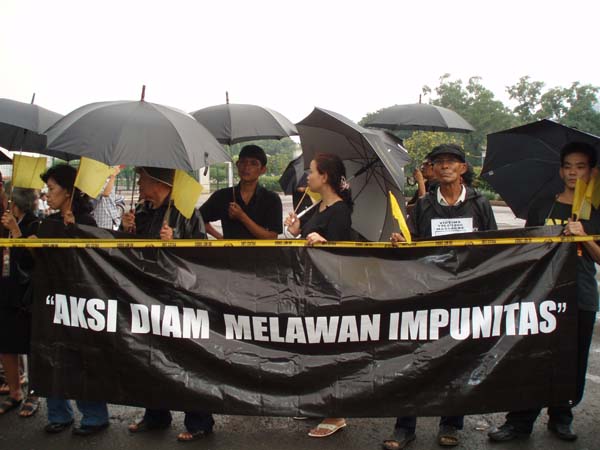Indonesian President-elect Joko Widodo must address key human rights issues during the first 100 days of his five-year term, FIDH and its member organization KontraS (The Commission for the Disappeared and Victims of Violence) said . On 22 July, Indonesia’s Election Commission (KPU) announced that Joko Widodo, widely known as ‘Jokowi’, won the 9 July presidential election.
Paris, Jakarta, 24 July 2014: Indonesian President-elect Joko Widodo must address key human rights issues during the first 100 days of his five-year term, FIDH and its member organization KontraS (The Commission for the Disappeared and Victims of Violence) said today. On 22 July, Indonesia’s Election Commission (KPU) announced that Joko Widodo, widely known as ‘Jokowi’, won the 9 July presidential election with 53% per cent of the vote against nearly 47% for former army general Prabowo Subianto. Voter turnout was about 70% of the more than 190 million eligible voters.
“In a region beset by military or military-backed regimes, one-party ruled countries, and long-lasting authoritarian governments, Indonesia’s presidential polls provided a refreshing reminder that free and fair multiparty elections remain a fundamental tenet of democracy,” said FIDH President Karim Lahidji. “The Indonesian people have spoken. Now it’s time for the new President to deliver on his campaign commitments aimed at improving the country’s human rights situation,” Mr. Lahidji urged.
In a document that outlined his vision, mission, and working programs for Indonesia, Mr. Widodo listed several key human rights pledges. They include: 1) combating impunity for past human rights violations; 2) ensuring that the rights of indigenous people are protected when development and investment projects are contemplated; 3) protecting freedom of religion; 4) and promoting the respect for human rights in ASEAN in accordance with the provisions of the ASEAN Charter.
“During the election campaign, Jokowi talked the talk about human rights. Now he has to show that he can walk the walk,” said KontraS Executive Director Haris Azhar. “The Indonesian people elected Jokowi because he represented a clean break from the country’s past. Now he has a golden opportunity to address the human rights challenges that he inherited from previous administrations. His priority should be to confront and eliminate the pervasive culture of impunity for serious human rights violations, particularly those committed by members of the armed forces and their proxies during decades of military rule,” Mr. Azhar added.
FIDH and KontraS call on President Widodo to to take significant steps during his first 100 days in order to address Indonesia’s key human rights challenges. Steps include:
- To thoroughly investigate serious human rights violations committed by the military and other law enforcement agencies and bring perpetrators to justice. Investigations must include the military’s role in the May 1998 riots in North Sumatra, Jakarta, and Central Java and the abduction and torture of 23 pro-democracy students in 1997-1998.
- To provide redress for victims of torture and other cruel, inhuman, or degrading treatment or punishment.
- To establish a commission of inquiry to investigate allegations of human rights violations in Papua and West Papua Provinces and hold perpetrators accountable.
- To establish a Truth and Reconciliation Commission in Aceh Province. and ensure its independence, transparency, and accountability
- To undertake a thorough review of the laws governing land ownership and use in order to provide a coherent legal framework that protects land rights and integrates human rights into the planning and implementation of investment, development, and infrastructure projects to include the MP3EI (Masterplan for Acceleration and Expansion of Indonesia’s Economic Development).
- To repeal laws and decrees that are not in line with international human rights standards on freedom of religion and belief to include the joint ministerial decree that bans religious activities by the Ahmadi Muslim community.
- To implement the recommendations that Indonesia accepted during its latest Universal Periodic Review (UPR) in May 2012, as well as the recommendations made by the UN Human Rights Committee in August 2013 and the UN Comittee on Economic, Social, and Cultural Rights in May 2014.
- To implement a moratorium on executions with a view to abolish the death penalty.
- To ratify key international human rights treaties including: the Rome Statute of the International Criminal Court; the International Convention on the Protection of All Persons from Enforced Disappearance; the Optional Protocol to the Convention against Torture, Cruel, Inhuman and Other Degrading Treatment; the two Optional Protocols to the Convention on the Rights of the Child; and ILO Convention 169 on the rights of indigenous and tribal peoples.
- To strengthen human rights protection in ASEAN by pushing for the introduction of a protection mandate for the ASEAN Inter-Governmental Commission on Human Rights (AICHR) during the review of its Terms of Reference (ToR) at the ASEAN Ministrial Meeting.
source: www.fidh.org
Organisation/s Involved
- FIDH
- KontraS (The Commission for the Disappeared and Victims of Violence)
How to Support The Campaign
Press contacts
Mr. Andrea Giorgetta (English) – Tel: +66 88 6117722 (Bangkok)
Ms. Audrey Couprie (French, English, Spanish) – Tel: +33 6 48 05 91 57 (Paris)


